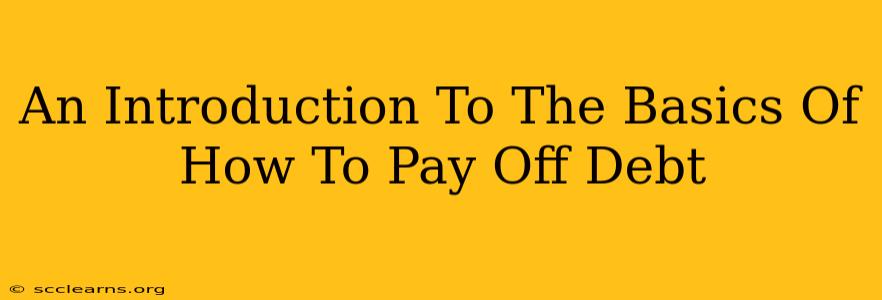Feeling overwhelmed by debt? You're not alone. Millions struggle with managing debt, but understanding the basics can empower you to take control and finally become debt-free. This guide offers a simple introduction to effective debt repayment strategies.
Understanding Your Debt Landscape
Before you can conquer your debt, you need to understand it. This means knowing exactly how much you owe, to whom, and the interest rates associated with each debt.
1. Gather Your Statements:
Collect all your statements: credit cards, loans, medical bills – everything. Create a spreadsheet or use a budgeting app to list each debt, including:
- Creditor: The name of the company you owe.
- Balance: The total amount you owe.
- Interest Rate: The annual percentage rate (APR). A higher APR means you're paying more in interest.
- Minimum Payment: The minimum amount due each month.
2. Prioritize Your Debts:
Once you have a clear picture of your debt, prioritize which debts to tackle first. Two popular methods are:
- Avalanche Method: Focus on paying off the debt with the highest interest rate first, regardless of the balance. This saves you the most money on interest in the long run.
- Snowball Method: Pay off the smallest debt first, regardless of the interest rate. This provides a quick sense of accomplishment and motivates you to continue.
Effective Strategies for Debt Repayment
Choosing a repayment method is only the first step. Here are some practical strategies to accelerate your debt payoff journey:
1. Budget Wisely:
Creating a realistic budget is crucial. Track your income and expenses meticulously to identify areas where you can cut back. This extra money can be allocated towards your debt payments.
Key Budgeting Tips:
- Identify Non-Essential Expenses: Can you reduce dining out, entertainment, or subscriptions?
- Automate Savings: Set up automatic transfers to your debt repayment account.
- Negotiate Lower Bills: Contact service providers to negotiate lower rates for internet, phone, or cable.
2. Increase Your Income:
Explore ways to increase your income to free up more cash for debt repayment. This might involve:
- Side Hustle: Find a part-time job or freelance work.
- Sell Unused Items: Declutter your home and sell unwanted items online or at a consignment shop.
3. Seek Professional Help:
If you’re struggling to manage your debt, don't hesitate to seek professional help. A credit counselor can provide guidance and potentially negotiate with creditors on your behalf. They may also help you create a debt management plan.
Maintaining Momentum and Avoiding Future Debt
Paying off debt is a marathon, not a sprint. Celebrate your successes along the way to stay motivated. Here's how to stay on track:
- Regularly Review Your Progress: Monitor your progress and adjust your strategy if needed.
- Reward Yourself (Wisely): Celebrate milestones with small, affordable rewards.
- Build an Emergency Fund: Once you're debt-free, build an emergency fund to prevent future debt accumulation. This will help you avoid relying on credit cards during unexpected expenses.
Conquering debt takes time, discipline, and a well-defined plan. By understanding your debt, creating a budget, and employing effective strategies, you can take control of your finances and build a brighter financial future. Remember, it's a journey, and every step you take towards financial freedom is a victory.

